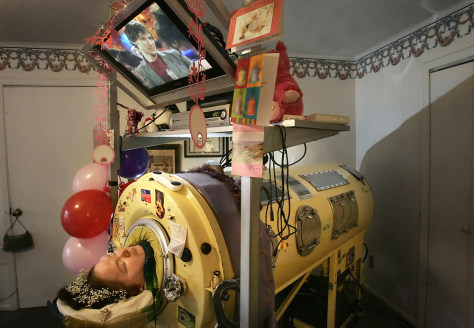
Vaccines are humankind's greatest medical boon.
Ever.
***
Playboy Bunny And Vaccine Denialist Jenny McCarthy:
Poster Girl For Self-Terrorization
MEMPHIS, Tenn. — A woman who spent nearly 60 years of her life in an iron lung after being diagnosed with polio as a child died Wednesday after a power failure shut down the machine that kept her breathing, her family said.
Dianne Odell, 61, had been confined to the 7-foot-long machine since she was stricken by polio at 3 years old.

In a photo taken last year, Dianne Odell watches her favorite soap opera at home in Jackson, Tenn. Odell, 61, died after a power failure shut down the machine that kept her breathing for 50 years.

In a photo taken last year, Dianne Odell watches her favorite soap opera at home in Jackson, Tenn. Odell, 61, died after a power failure shut down the machine that kept her breathing for 50 years.
Family members were unable to get an emergency generator working for the iron lung after a power failure knocked out electricity to the Odell family’s residence near Jackson, about 80 miles northeast of Memphis, brother-in-law Will Beyer said.
“We did everything we could do but we couldn’t keep her breathing,” said Beyer, who was called to the home shortly after the power failed. “Dianne had gotten a lot weaker over the past several months and she just didn’t have the strength to keep going.”
Capt. Jerry Elston of the Madison County Sheriff’s Department said emergency crews were called to the scene, but could do little to help.
Odell was afflicted with “bulbo-spinal” polio three years before a polio vaccine was discovered and largely stopped the spread of the crippling childhood disease.
She spent her life in the iron lung, cared for by her parents, other family members and aides provided by a nonprofit foundation. Though confined inside the 750-pound apparatus, Odell managed to get a high school diploma, take college courses and write a children’s book about a “wishing star” named Blinky“Dianne was one of the kindest and most considerate people you could meet. She was always concerned about others and their well-being,” said Frank McMeen, president of the West Tennessee Health Care Foundation which helped raise money for equipment and nursing assistance for Odell.
Odell accepted her life with grace, McMeen said.
“Everyone she encountered came to her because they cared about her,” he said, “so she grew up in her 61 years thinking every person is good.”
Odell’s iron lung, similar to those used during the U.S. polio epidemics that peaked in the 1950s, was a cylindrical chamber with a seal at the neck. She lay on her back with only her head exposed and made eye contact with visitors through an angled mirror. She operated a television set with a small blow tube and wrote on a voice-activated computer.
The positive and negative pressures produced by the machine forced air into her lungs and then expelled it.
Iron lungs were largely replaced by positive-pressure airway ventilators in the late 1950s that give users much more freedom of movement. But a spinal deformity from the polio kept Odell from wearing a more modern, portable breathing device.
Joan Headley of Post-Polio Health International in St. Louis said about 30 people in the United States still rely on iron lungs but few users are confined to them all the time. No one keeps records, she said, on the longest confinement.
Caregivers could slide Odell’s bedding out of her iron lung for basic nursing care but only briefly, McMeen said.
Though Odell could not leave the iron lung, she was able to be moved in the machine out of her home. For Odell’s 60th birthday, in February 2007, friends and family held a party for her, with about 200 guests, at a downtown hotel in Jackson, a town of about 50,000 residents.
“She had a 9-foot birthday cake and she had letters from well-wishes from people all over the country,” McMeen said.
In a 2001 interview with The Associated Press, Odell said she wrote her children’s book to show youngsters, especially those with physical disabilities, that they should never give up.
“It’s amazing what you can accomplish if you see someone do the same thing,” she said.
Copyright 2008 The Associated Press. All rights reserved. This material may not be published, broadcast, rewritten or redistributed.

No comments:
Post a Comment